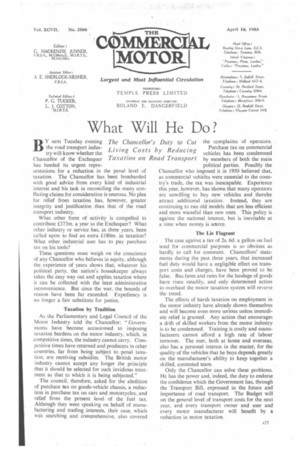What Will He Do?
Page 27

If you've noticed an error in this article please click here to report it so we can fix it.
BY next Tuesday evening the road transport indus try will know whether the Chancellor of the Exchequer has heeded its urgent representations for a reduction in the penal level of taxation. The Chancellor has been bombarded with good advice from every kind of industrial interest and his task in reconciling the many conflicting claims for consideration is onerous. No plea for relief from taxation has, however, greater integrity and justification . than that of the road transport industry.
What other form of activity is compelled to contribute £373m. a year to the Exchequer? What other industry or service has, in three years, been caned upon to find an extra £180m. in taxation? What other industrial user has to pay purchase tax on his tools?
These questions must weigh on the conscience of any Chancellor who believes in equity, although the experience of years shows that, whatever his political party, the nation's housekeeper always takes the easy way out and applies taxation where it can be collected with the least administrative inconvenience. But since the war, the bounds of reason have been far exceeded. Expediency is no longer a fair substitute for justice.
Taxation by Tradition As the Parliamentary and Legal Council of the Motor Industry told the Chancellor: " Govern. ments have become accustomed to imposing taxation burdens on the motor industry, which, in competitive times, the industry cannot carry. Competitive times have returned and producers in other countries, far from being subject to penal taxation, are receiving subsidies. The British motor industry cannot accept any longer the principle that it should be selected for such invidious treatment as that to which it is being subjected."
The council, therefore, asked for the abolition of purchase tax on goods-vehicle chassis, a reduction in purchase tax on cars and motorcycles, and relief from the present level of the fuel tax. Although they were speaking on behalf of manufacturing and trading interests, their case, which wds searching and Comprehensive. also covered the complaints of operators.
Purchase tax on commercial vehicles has been condemned by members of both the main political parties. Possibly the Chancellor who imposed it in 1950 believed that, as commercial vehicles were essential to the country's trade, the tax was inescapable. Experience this year, however, has shown that many operators are unwilling to buy new vehicles and thereby attract additional taxation. Instead, they are continuing to run old models that are less efficient and more wasteful than new ones. This policy is against the national interest, but is inevitable at a time when money is scarce.
The Lie Flagrant The case against a tax of 2s. bd. a gallon on fuel used for commercial purposes is so obvious as hardly to call for comment. Chancellors' statements during the past three years, that increased fuel duty would have a negligible effect on transport costs and charges, have been proved to be false. Bus fares and rates for the haulage of goods have risen steadily, and only determined action to overhaul the motor taxation system will reverse the trend.
The effects of harsh taxation on employment in the motor industry have already shown themselves and will become even more serious unless immediate relief is granted. Any action that encourages a drift of skilled workers from the motor industry is to be condemned. Training is costly and manufacturers cannot afford a high rate of labour turnover. The user, both at home and overseas, also has a personal interest in the matter, for the quality of the vehicles that he buys depends greatly on the manufacturer's ability to keep together a skilled, contented team.
Only the Chancellor can solve these problems. He has the power and, indeed, the duty to endorse the confidence which the Government has, through the Transport Bill, expressed in the future and importance of road transport. The Budget will set the general level of transport costs for the next year, and every transport owner and user and every motor manufacturer will benefit by a reduction in motor taxation.




















































































